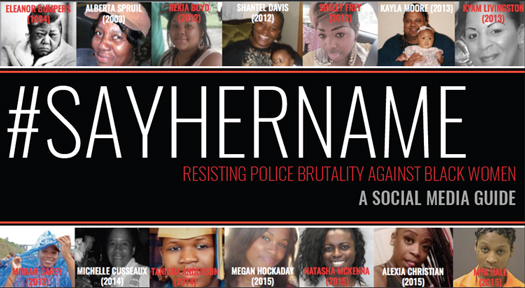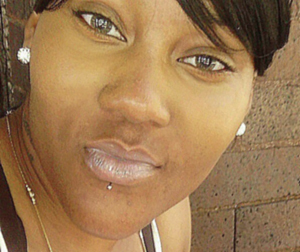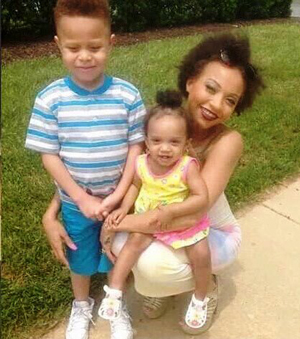Violence, abuse and losing the lives of Black women
By J.A. Salaam and Rhodesia Muhammad | Last updated: Apr 24, 2018 - 1:47:01 PMWhat's your opinion on this article?

|
“You know why Black people are treated the way we are treated, and Black women are being victimized? It’s because this is a systemic issue in this country. And Black people are looked at as animals, like we don’t feel pain and can be treated any kind of way,” said Angeline Bernard, founder of Washington Global Management Inc., whose organization focuses on empowering women and girls.
“Women in general have been so diminished to nothing in this society that we are looked at as objects to be used and not respected. We must have a man figure in their lives, not necessarily our father, but an uncle, granddad, etc., that shows them true love,” she said.
Black women are disproportionately abused, raped and murdered in personal crimes and are disproportionately beaten and killed in encounters with law enforcement. So breaking cycles of abuse and getting help may not be as easy as some think.
“Mental health issues and depression is very high among our women. And is getting worse because racism and hate is so transparent now,” Ms. Bernard explained.
“Job discrimination, lack of resources to provide for themselves and their families is a major contributor to the abuse and struggles Black women deal with daily. Without education and proper upbringing women become dependent on men and government assistance and barely can survive and most times accept all kinds of abuse and mistreatment because they feel trapped in their condition.”
Across the country, there are horror stories about the killings of Black women:

Jessica Hampton
|
Twenty-five-year-old Monica Sykes of St. Louis, Mo., was reported missing in October 2016. Her body was found four months later in a wooded area less than five miles from her home. According to authorities she was shot in the head and dumped there by her ex-boyfriend and his brother, both men are charged with her death.
Reina Sykes said during an interview after her daughter was identified, “There are some moments I don’t even know how to process that, I just never wanted to be a mom that is walking the earth and her child is no longer here.” She added, “It’s heartbreaking to know they would discard your child like a piece of trash.”
“First of all, in this society women are already looked at as second class and as Black women, we are, according to this world … least desirable,” said Dr. Rahsheda Perine, a clinical psychologist. “So, if we are least desirable then no one cares about what happens to us. Ultimately, we’ve become numb. We’re so used to seeing images of us being hurt and in pain, whether it’s through slave movies or reality TV, we’ve become desensitized and immune to it.”
Sadiyah Evangelista Karriem, co-founder of Queendom Come, Inc., a Houston mentoring organization that teaches Black women and girls their value, said some still don’t believe the Black woman should be honored and revered.
“I don’t know the circumstances or the situation that caused Ms. Odom to be brutally murdered and dismembered and maimed like she was, but it’s an act of aggression and violence,” Ms. Karriem stated.
The Black man must become a protector of the Black woman, but he’s unable to do that because a lot of times he’s the victimizer, she said. “Black men have not been properly taught to honor the Black woman and revere the Black woman,” Ms. Karriem asserted. “They don’t honor their own mother, but we know that it’s been set up that way. So, unfortunately, when we look at Sister Brandy, she is the face of many that don’t have a name.”

Korryn Gaines, 23 year-old woman who was shot and killed by poilce near Baltimore, in a picture with her children.
|
A nationwide study by Washington University in St. Louis found Blacks, especially women, are more likely to have been unarmed when killed by police than non-Blacks, and that risk appears to increase in police departments with a greater presence of non-White officers. A key finding of the study is that nearly 60 percent of Black women killed by police were unarmed at the time of the interaction.
An African American Policy Forum report, “Say Her Name: Resisting Police Brutality Against Black Women, found “women and girls are subject to police profiling, abuse, excessive force, and police killings just as much as men and boys. However, media, researchers, and advocates tend to exclude Black women and focus only on how profiling impacts Black men. Police matters involving Black women and girls receive less community support and corporate controlled media attention.” The report was released in 2015.
Antwynette Houston and Earledreka White, were both victims of police brutality and are still fighting to get their voices heard.
“I felt like I got a lot of push back because I was a woman. If I were a man, whether White or Black, I feel I would’ve been taken seriously. I think people just expect us to keep our mouths closed,” said Ms. Houston, who was yanked from her car and dragged across a gas station parking lot by an off-duty Louisville, Ky., Metro police officer in 2013. She was left with life changing injuries.
“Even though I was considered a good girl in my church, I sung in my choir for 17 years; I was at my church for 22 years; I was completely abandoned. I lost friends and family,” Ms. Houston stated. “When I started standing up for myself, I started to feel like no one wanted to see a Black woman stand up for herself because then you’re considered an angry Black woman and you’re considered a trouble maker.”
Earledreka White said she felt less than human when she was pulled out of her car by a police officer of the Metropolitan Transit Authority of Harris County in Houston, Texas, in 2016.
“As Black women, I feel like we’ve been brainwashed,” Ms. White said. “We don’t know who we are, we don’t know our heritage, and we don’t know our lineage, so we really don’t have an identity. How do you teach a person to know who they are if they don’t even know where they come from? Until we are re-educated, we will continue to be disregarded.”
“It’s time for the nation to hear and acknowledge the unique history of African American women in America,” said Kimberlé Williams Crenshaw, co-founder and executive director of African American Policy Forum, an organization based in New York City that fights for racial and gender equity.
“Black women’s intersectional experiences of racism and sexism have long been forgotten,” said Ms. Crenshaw. “We must begin to tell Black women’s stories, because without them we cannot tell the story of Black men, White men, White women or anyone else in this country. The story of Black women is critical because those who don’t know their history are doomed to repeat it.”
According to the Texas Department of Public Safety, Black women are one of the fastest-growing demographic groups to obtain permits to carry a concealed weapon. Black women say carrying a gun is necessary for protection and power.
INSIDE STORIES AND REVIEWS
-
-
About Harriett ... and the Negro Hollywood Road Show
By Rabiah Muhammad, Guest Columnist » Full Story -
Skepticism greets Jay-Z, NFL talk of inspiring change
By Bryan 18X Crawford and Richard B. Muhammad The Final Call Newspaper @TheFinalCall » Full Story -
The painful problem of Black girls and suicide
By Charlene Muhammad -National Correspondent- » Full Story -
Exploitation of Innocence - Report: Perceptions, policies hurting Black girls
By Charlene Muhammad -National Correspondent- » Full Story -
Big Ballin: Big ideas fuel a father’s Big Baller Brand and brash business sense
By Bryan Crawford -Contributing Writer- » Full Story






 Click Here Stay Connected!
Click Here Stay Connected!








